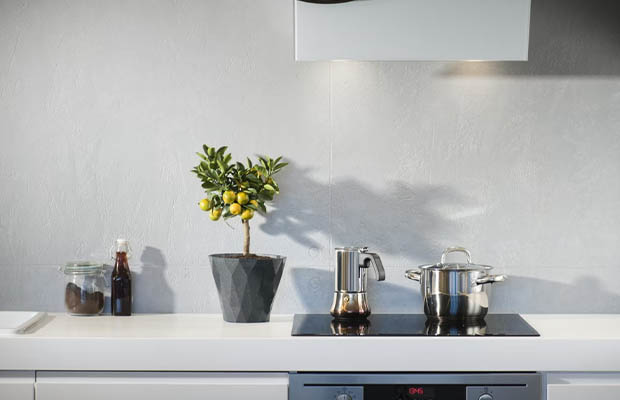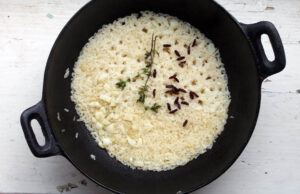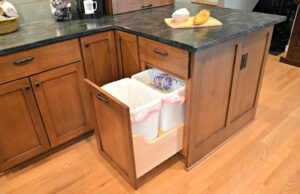You cook for your family on your kitchen counters, so you want them to be as secure as you can make them. To protect your family from illness, you want to make sure they are bacteria-free.
Oven cleaners work wonders at removing tough grease and stains from your oven, but they are by no means intended to be used as all-purpose kitchen cleaners. You shouldn’t use oven cleaner on kitchen countertops because the chemicals in it have the potential to be very potent, toxic, and corrosive.
Using oven cleaners on kitchen counters can damage the material of your countertop, leading to corrosion, fading, loss of color, or simply rendering it completely unusable. But there’s more than just that, and we talk about it all in this article while also offering you some different ways to clean the kitchen counters.
Therefore, how do kitchen countertops react to oven cleaners? Let’s find out!
Read More: Paint Kitchen Tiles
Table of Contents
Dangerous Ingredients In Oven Cleaner
A lot of stress is placed on your oven. With each use, the amount of grease and grime baked into the oven increases due to food and oil splatters, gritty baking trays, and extremely high temperatures.
Yikes.
Therefore, in order to effectively clean those oven walls, oven cleaner chemicals must be STRONG. Especially on countertops made of flimsier materials like wood or laminate, using these potentially toxic chemicals to clean kitchen surfaces is not a good idea.
What Oven Cleaner Chemicals Should Be Avoided?
So what exactly are these dangerous substances found in oven cleaners? The following are some of the key components to watch out for:
- Turpentine
- Degreasers
- Foaming agents
- Crystallization agents
- Sodium Hydroxide
- Butane
- Monoethanolamine (MEA)
- Monobutyl ether
- Diethylene Glycol
These chemicals can pose health risks by contaminating your food and leading to food poisoning in addition to destroying your kitchen surface and fading the color away.
When chopping vegetables, for example, leftover oven cleaner residue on your countertops may react with the food you’re preparing.) and cause chemical reactions that eat away at the kitchen surface even more so.

Brief Effects Of An Oven Cleaner On A Countertop
1. Corrosion
Many oven cleaners are made with powerful cleaning agents. Manufacturers will declare them to be corrosive in clear, large print, and any overspray of these chemicals can even irritate the skin.
Why is it okay to use these products in ovens? Stainless steel with an acrylic enamel finish is the material used in the majority of ovens. A hard shell of enamel forms over the metal, adding an additional layer of defense against chemical spills and fumes.
2. Discoloration
On light-colored quartz countertops, chemical reactions may leave behind white marks, blotches, and dull spots that can be very noticeable. It can be challenging to eliminate the effects of a long-lasting chemical reaction with stain removers or rubbing alcohol.
3. Streaks
Grease, food particles, and other grime are likely to be left behind if you use an oven cleaner on your kitchen countertop.
4. Fading and staining
Though not completely stain-proof, quartz countertops’ non-porous surface makes them highly stain-resistant.
Effect Of Oven Cleaners On Different Countertop Materials
Well, that depends on the type of countertop material that we are using. Depending on the material your surface is made of, oven cleaners may cause degradation or leave it relatively unscathed because they contain ingredients that react differently with various materials.
We will examine the impact of oven cleaner on countertops made of Formica, stainless steel, stone, and tile in the kitchen.
Stainless Steel Countertops
Stainless steel countertops are typical in contemporary kitchens and commercial kitchens for restaurants, but what happens if you try to clean them with oven cleaner spray?
Though it depends on the formulation, the chemicals in the oven cleaner will typically leave stains on stainless steel.
Although some steel counters might withstand the spray, it is not worth the risk because the chemicals could later contaminate the food that has been prepared on the surface.
Instead, you should try this
Clean these kitchen countertops frequently with some warm water and dish soap; it couldn’t be simpler.
Due to its resistance to penetration and stains, stainless steel makes an excellent material for kitchen countertops. Cleaning stainless steel is typically not too difficult.
Try mixing hot water and white vinegar in a spray bottle for tougher stains or deeper cleaning. Let it sit for a few minutes before removing it with warm, soapy water.
Stone Countertops
Oven cleaner ingredients like sodium hydroxide make stone countertops susceptible to tarnishing, but they typically withstand the effects of oven cleaners much better than most surfaces.
This is so because the majority of stone kitchen counters are made of natural stones, or stones that formed naturally in the Earth. Granite and marble countertops are two examples of natural stones that are inert by nature and thus challenging to tan.
However, that doesn’t make it impossible!
Quartz countertops, however, are most susceptible to deterioration and color fading. This is due to the fact that this type of kitchen counter is made of engineered stone, also known as “manmade stone,” which was assembled manmade using particular pigments to add color.
Due to the harsh effects of oven cleaners, these synthetic colors are much more susceptible to color fading. In these situations, natural rocks are typically much more resilient.
Instead, you should try this
Read up on your specific stone material (granite, marble, quartz, etc.) as each type of stone has slightly different cleaning requirements.) to see what you need to do to clean it.
Never assume; always make sure!
On stone countertops, however, warm water and mild dish soap are usually fine. You can also find cleaning supplies made for particular surfaces like marble and granite.
If you have granite countertops, you should regularly apply a granite sealer to protect them. This solution creates a protective barrier that makes the countertops much more difficult to stain by soaking into the stone.
Tile Countertops
Even though there aren’t many homes with tile countertops, when they do, many homeowners get frustrated with how difficult it is to clean the grout lines and resort to oven cleaners.
While it might appear that the oven cleaner’s chemicals could help clean your grimy grout, trust us when we say that they will actually cause more harm than good.
The top finish of this surface will be eaten away by oven cleaners when you spray them on it, and the grout will eventually start to suffer as a result.
Oven cleaners are ineffective for cleaning countertops made of tile.
Instead, you should try this
Instead, prepare a mixture of warm water and dish soap in a small mixing bowl or spray bottle. Clean the tiles thoroughly with a sponge or cloth until they resemble new ones.
If you want to go a more DIY route with the grout, think about using specialized grout cleaning tools or an old toothbrush or toothpick.
Additionally, you can purchase specialized tools that remove the very top layer of the grout, leaving you with a brand-new, spotless grout surface that you can continue to maintain.
Formica Countertops
Despite being one of the toughest surfaces available, this countertop’s laminate-like finish is still susceptible to oven cleaner’s effects.
No counter is secure!
It is not worth the risk to clean Formica countertops with oven cleaners because doing so could cause color and finish fading and other damage.
Instead, you should try this
Along with the time-tested solution of mild dish soap and water, an all-purpose kitchen cleaner typically works very well on Formica kitchen counter surfaces.
For removing tough stains from their countertops, the Formica corporation also suggests using a few other cleaners, such as:
- Liquid Dish Soap
- Formula 409
- Original Formula Pine-Sol
- Windex
In light of this, Windex is acceptable to use on Formica kitchen countertops instead of oven cleaners. Go figure!
Wooden Countertops & Butcher’s Blocks
Especially if the wooden surface of the wood countertop is covered with a thin veneer resembling laminate, DON’T use oven cleaner on the wooden surface.
This also applies to wooden butcher blocks.
If applied to these wooden countertops, you risk getting a bubbling reaction that transforms the surface into an odd, gooey paste, which could completely ruin the wood countertops.
If you clean with oven cleaner, you might need to make significant repairs to your wood countertops; don’t take that chance.
Instead, you should try this
To clean your wooden countertops, simply use warm water, mild soap, and a soft cloth. Use a spray bottle to apply it, and then a clean cloth to wipe it down.
Allow to air dry, or use a fresh paper towel to absorb any remaining moisture.
NEVER immerse wooden countertops or butcher blocks in water; doing so can cause the wood to swell excessively and result in rot, mold, and moisture problems.
After cleaning your wood countertops, you might want to use specialized wood oil to protect the surface and improve the aesthetics.
Some Alternatives To Oven Cleaner On Countertops
An oven cleaner is sure to cut through all that and more, so you may be forced to use one due to a stubborn stain or grease that is difficult to remove. Fortunately, there are safer but equally effective substitutes to take into account that are significantly more reliable for spot cleaning on an individual basis.
- Windex: Although a lot of cleaners might leave streaks, the majority of glass cleaners are made to leave your surface streak-free. They might not have the same ability to remove tough stains like rubbing alcohol, though.
- Warm water and mild soap: Your countertops will be maintained for many years with this easy mixture, which is safe for daily cleaning.
Tips To Remove Stubborn Stains From Kitchen Counters
Okay, so you’re desperately trying to get rid of some tough stains from your kitchen countertop, but you’ve since realized that the chemicals in oven cleaner products aren’t really doing you any good.
What should you do?
Baking Soda Method
Look into the traditional baking soda method to remove stains from your kitchen countertops:
- Combine equal amounts of baking soda (sodium bicarbonate) & white vinegar in a small bowl
- Mix the 2 ingredients until they form a paste
- Apply liberally to your stained kitchen countertop
- Allow the mixture to sit on the stains for 24-48 hours
You can get rid of stains without using the harsh chemicals found in oven cleaners by using this mixture to effectively soak up stains from the kitchen countertops.
To help protect it and help remove the stains even more successfully, some homeowners cover this mixture with plastic wrap. Any countertop, including those made of wood, can be used with this technique.
Bleach & Cotton Ball Method
The bleach and cotton ball technique is another typical stain removal technique.
Just dunk a cotton ball into some mild bleach. Following that, gently bleach the stains off the kitchen countertops by rubbing the area with the bleach on the cotton ball for a while.
Clean the area as usual once you’re finished.
Don’t use too much bleach, and stop using it as soon as you notice any discoloration. Keep in mind that bleach can remove the color from things, so while it can be great for getting rid of color stains, it can also go too far and remove the color from the countertop itself.
The Bottom Line
A durable surface will be provided by properly maintaining your natural stone or engineered quartz countertop. Use caution when employing oven cleaners, abrasive cleaners, acidic cleaners, or even dry cleaning detergents. If spills are cleaned up right away and gentle cleaning techniques are employed, quartz doesn’t require much maintenance.


